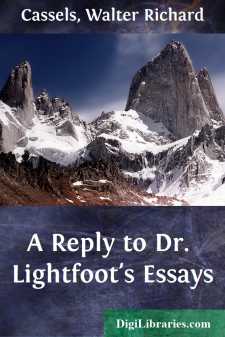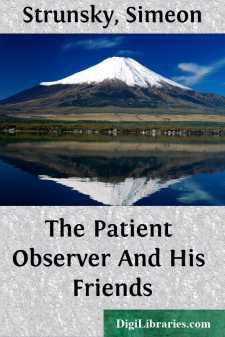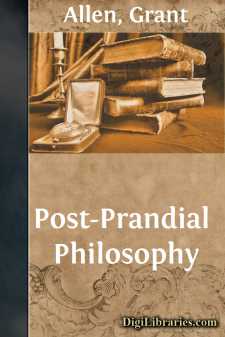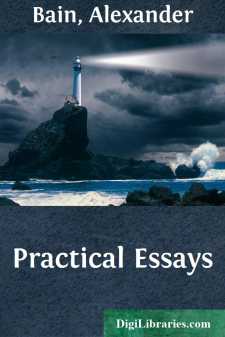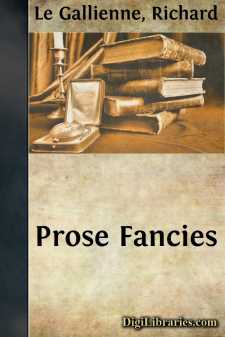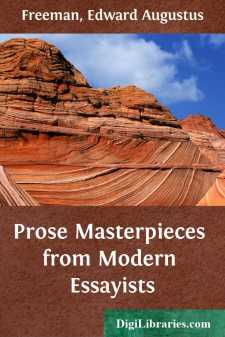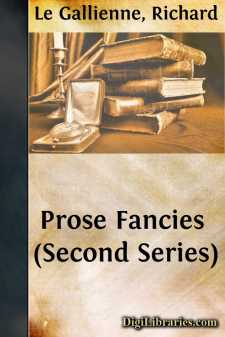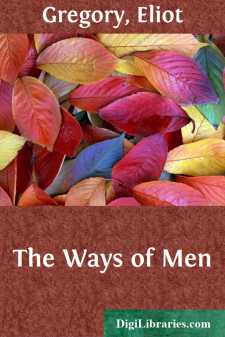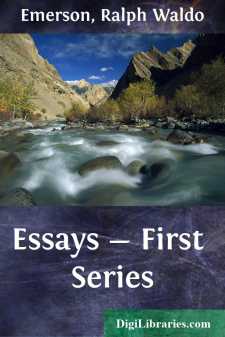Literary Collections
- American 84
- Ancient, Classical & Medieval 14
- Asian 1
- Australian & Oceanian 1
- Canadian 55
- Continental European 121
- English, Irish, Scottish, Welsh 179
- Essays
- General 24
- Letters 46
- Middle Eastern 1
Essays Books
Sort by:
INTRODUCTION. I sincerely rejoice that Dr. Lightfoot has recovered from his recent illness. Of this restoration the vigorous energy of his preface to his republication of the Essays on Supernatural Religion affords decided evidence, and I hope that no refutation of this inference at least may be possible, however little we may agree on other points. It was natural that Dr. Lightfoot should not be...
more...
by:
Simeon Strunsky
COWARDS It was Harrington who brought forward the topic that men take up in their most cheerful moments. I mean, of course, the subject of death. Harrington quoted a great scientist as saying that death is the one great fear that, consciously or not, always hovers over us. But the five men who were at table with Harrington that night immediately and sharply disagreed with him. Harding was the first to...
more...
by:
Grant Allen
THE STRUGGLE FOR LIFE AMONG LANGUAGES. A distinguished Positivist friend of mine, who is in most matters a practical man of the world, astonished me greatly the other day at Venice, by the grave remark that Italian was destined to be the language of the future. I found on inquiry he had inherited the notion direct from Auguste Comte, who justified it on the purely sentimental and unpractical ground...
more...
by:
Alexander Bain
I. On the prevailing errors on the mind, proposed to be considered in this paper, some relate to the Feelings, others to the Will. In regard to Mind as a whole, there are still to be found among us some remnants of a mistake, once universally prevalent and deeply rooted, namely, the opinion that mind is not only a different fact from body—which is true, and a vital and fundamental truth —but is to...
more...
A SPRING MORNING I Spring puts the old pipe to his lips and blows a note or two. At the sound, little thrills pass across the wintry meadows. The bushes are dotted with innumerable tiny sparks of green, that will soon set fire to the whole hedgerow; here and there they have gone so far as those little tufts which the children call 'bread and cheese.' A gentle change is coming over the grim...
more...
THE SCIENCE OF HISTORY. A LECTURE DELIVERED BY JAMES ANTHONY FROUDE AT THE ROYAL INSTITUTION FEBRUARY 5, 1864. Ladies and Gentlemen,—I have undertaken to speak to you this evening on what is called the Science of History. I fear it is a dry subject; and there seems, indeed, something incongruous in the very connection of such words as Science and History. It is as if we were to talk of the color of...
more...
A SEVENTH-STORY HEAVEN At one end of the city that I love there is a tall, dingy pile of offices that has evidently seen more prosperous fortunes. It is not the aristocratic end. It is remote from the lordly street of the fine shops of the fair women, where in the summer afternoons the gay bank clerks parade arm-in-arm in the wake of the tempestuous petticoat. It lies aside from the great exchange...
more...
by:
Jonathan Swift
INTRODUCTION Swift has been styled the Prince of Journalists. Like most titles whose aim is to express in modern words the character and achievements of a man of a past age, this phrase is not of the happiest. Applied to so extraordinary a man as Jonathan Swift, it is both misleading and inadequate. At best it embodies but a half-truth. It belongs to that class of phrases which, in emphasizing a...
more...
by:
Eliot Gregory
CHAPTER 1—“Uncle Sam” The gentleman who graced the gubernatorial armchair of our state when this century was born happened to be an admirer of classic lore and the sonorous names of antiquity. It is owing to his weakness in bestowing pompous cognomens on our embryo towns and villages that to-day names like Utica, Syracuse, and Ithaca, instead of evoking visions of historic pomp and circumstance,...
more...
I. HISTORY. THERE is one mind common to all individual men. Every man is an inlet to the same and to all of the same. He that is once admitted to the right of reason is made a freeman of the whole estate. What Plato has thought, he may think; what a saint has felt, he may feel; what at any time has befallen any man, he can understand. Who hath access to this universal mind is a party to all that is or...
more...


